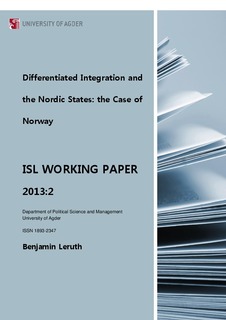| dc.contributor.author | Leruth, Benjamin | |
| dc.date.accessioned | 2013-07-15T10:40:30Z | |
| dc.date.available | 2013-07-15T10:40:30Z | |
| dc.date.issued | 2013 | |
| dc.identifier.issn | 1893-2347 | |
| dc.identifier.uri | http://hdl.handle.net/11250/134928 | |
| dc.description | Presentation on department page: http://www.uia.no/no/portaler/om_universitetet/oekonomi_og_samfunnsvitenskap/statsvitenskap_og_ledelsesfag/ forskning_isl/isl_working_papers_series | no_NO |
| dc.description.abstract | Since the early 1990s, the relationship between Norway and the European Union (EU) became increasingly complex and accounts for about three quarters of the European legislation. Despite the outcome of the 1994 referendum on EU membership, the various Norwegian governments progressively decided to keep on deepening their cooperation with Brussels. The main objectives of this paper are to describe this complex Norway-EU relationship, how it evolved since the early 1990s, and how it constitutes a relevant example of both internal and external differentiated integration. An overview of the different types of differentiated integration and the evolution of its categorisation are firstly given. The range of agreements between Norway and the EU is analysed per policy areas. In order to explain why Norwegian governments adopted specific positions regarding European integration since the early 1990s, some explanatory factors are then briefly outlined. Finally, it is concluded that as full EU membership does not seem to be a politically viable option in Norway for the past decades, differentiated integration is likely to remain central in the long run. | no_NO |
| dc.language.iso | eng | no_NO |
| dc.publisher | Department of Political Science and Management, University of Agder | no_NO |
| dc.relation.ispartofseries | ISL Working Papers;2013:2 | |
| dc.subject | political science | no_NO |
| dc.title | Differentiated Integration and the Nordic States: the Case of Norway | no_NO |
| dc.type | Working paper | no_NO |
| dc.source.pagenumber | 25 | no_NO |
